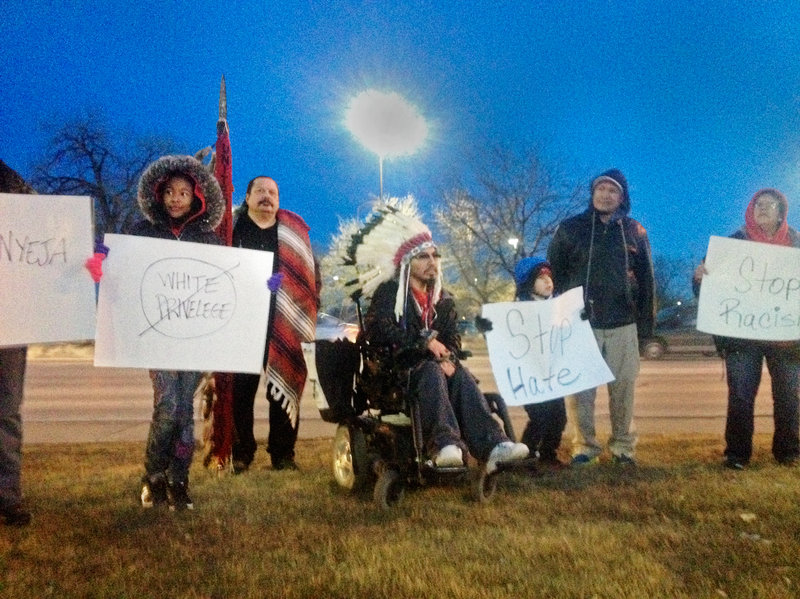By Jim Stasiowski, Rapid City Journal
Rapid City is among the defendants that may be sued in federal court by the Native American students who were the targets of alleged beer-spilling and racial taunts at a January hockey game in the Rushmore Plaza Civic Center.
A Minneapolis lawyer, Robert R. Hopper, has filed in the U.S. District Court of South Dakota a “pre-suit notice” alleging “atrocious behaviors” by some of the defendants at the Jan. 24 Rapid City Rush game.
But the lawyer for one of the defendants responded that the notice is “little more than a shakedown for money.”
State law requires that to sue a “public entity,” such as the city, over some incident, written notice must be given within 180 days of the incident. Thus, the deadline for giving the city written notice occurs this week.
Named as prospective defendants in the yet-to-be-filed suit are the city of Rapid City, which operates the Rushmore Plaza Civic Center, in which the Rush play their games; Eagle Sales of the Black Hills, which leases the luxury box from which the beer-spilling and racial taunts reportedly came; Trace O’Connell, a Philip resident who has been charged with disorderly conduct in connection with the incident; and “other guests of Eagle Sales’ box suite” on the night of the game.
Rapid City Mayor Steve Allender on Saturday said he had “skimmed” the pre-suit notice and has scheduled an executive session at the Monday night Rapid City Council meeting for council members to discuss the possible lawsuit with legal counsel.
“I guess it wasn’t unexpected,” Allender said.
“It could very well be that the impact might be to elicit a settlement” from the defendants, he added. An attempt Saturday to reach an executive with Eagle Sales was unsuccessful.
O’Connell’s attorney in the disorderly conduct case, Michael J. Butler, responded in an email:
“The notice to bring a lawsuit against Rapid City, the Civic Center, Eagle Sales, my client, and others is little more than a shakedown for money, captioned as a lawsuit claiming racism. I am familiar with the investigation. This case is not about racism, but it is about a few who are advancing a personal agenda and using race to do it. The lawyer filing notice should take some time to inform himself of the investigation and do his homework. ”
The pre-suit notice lists as plaintiffs parents who are acting on behalf of the students. In a cover letter, Hopper refers to the plaintiffs as a “Putative Class of Native American Children.”
The pre-suit notice says the plaintiffs “and putative plaintiffs class (were) subjected to (1) an escalating series of racially derogatory comments; (2) foul language; (3) objects, including bottle caps and Frisbees, thrown at them; and (4) spitting, spraying and throwing of beer onto their clothing, in their hair, and on their faces.”
Some of those accusations are familiar, although the references to thrown bottle caps and Frisbees apparently are new.
The pre-suit notice said the “atrocious behaviors” were committed by “several adults … in a private suite … leased by the Civic Center to Eagle Sales of the Black Hills, Inc.”
Those actions, the notice says, “were allowed to perpetuate and were exasperated by the negligence of the Civic Center and its responsible agents and employees acting in their official capacity on behalf of the City.” In an email, Hopper said “exasperated” should have been “exacerbated,” and he explained that an auto-correct feature on his computer made the mistake.
The students, all from the American Horse School on the Pine Ridge Indian Reservation, were at the game as a reward for academic success. They were accompanied by adult chaperons. The group had 65 tickets to the game.
After a lengthy investigation, O’Connell was charged with disorderly conduct, a Class 2 misdemeanor. His trial is scheduled for Wednesday and Thursday this week in the Historic Theatre at Rapid City High School.







